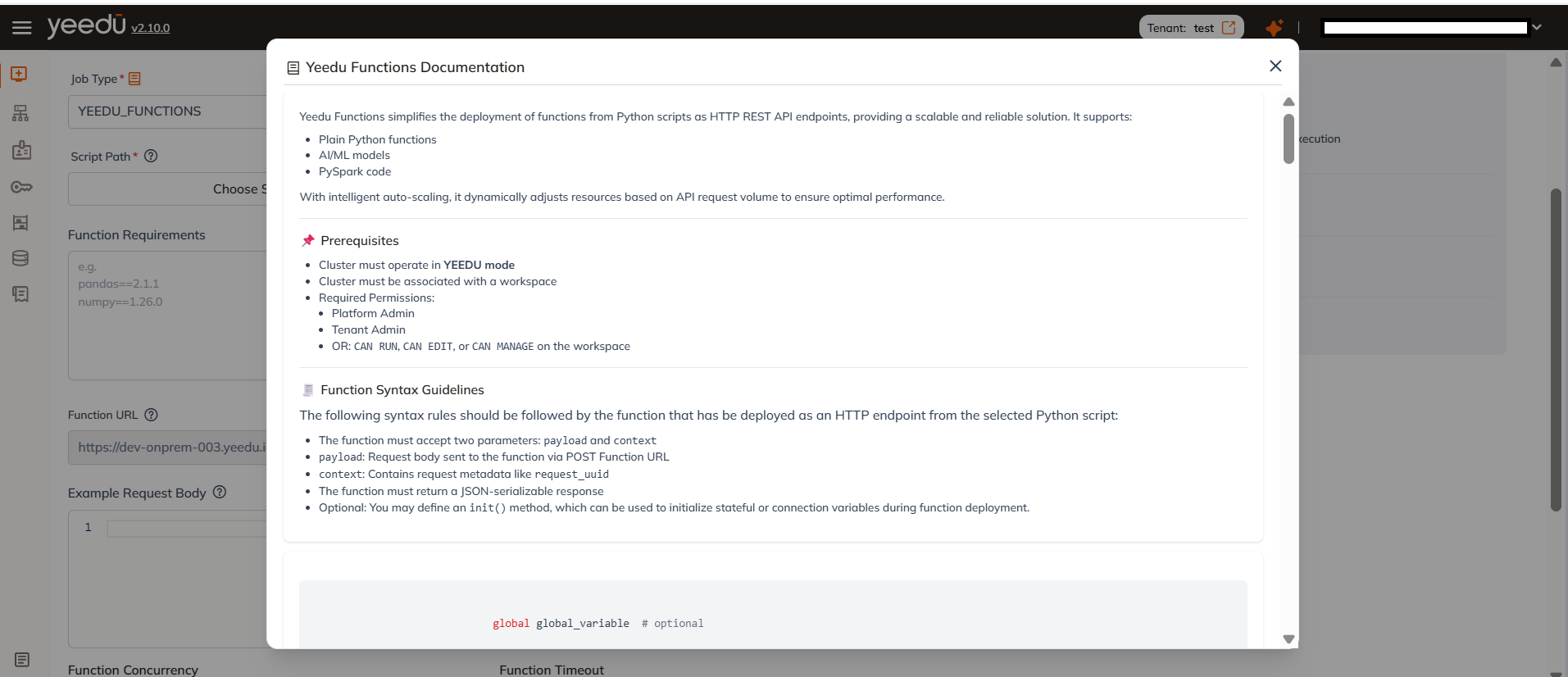In modern data platforms, simplicity and scalability are the ultimate goals — but they often live at opposite ends of the spectrum. As engineers, we want the freedom to build anything from quick utility scripts to full-fledged machine learning APIs, yet without the friction of infrastructure setup, environment conflicts, or deployment pipelines.
That’s exactly where Yeedu Functions changes the game.
With Yeedu Functions, users can deploy Python functions, deploy ML models, or PySpark code as fully managed HTTP REST API endpoints — all from within the Yeedu UI. No servers to configure, no Dockerfiles to maintain, and no complex CI/CD setups to babysit.
Let’s explore how the cloud cost optimization solution - Yeedu, provides an intuitive developer UX and the power of Yeedu Functions make life easier for developers, analysts, and data scientists alike.
Traditionally, deploying a Python script as an API endpoint involves multiple steps: packaging the code, defining API routes, setting up servers, managing dependencies, scaling infrastructure, and more.
In Yeedu, we designed the Functions UX to make this process radically simpler — just pick a script, specify a function, and deploy.
Once deployed, you can monitor and manage the API directly within the Yeedu UI — all without writing a single line of backend or infrastructure code. This seamless flow reflects Yeedu’s design philosophy: hide the complexity, highlight the purpose.

At its core, Yeedu Functions provides a serverless-style execution environment for Python functions deployment, allowing users to operationalize script logic without thinking about infrastructure.
Each function follows a simple, consistent syntax:
def function(payload, context):
# Function logic here
return {} Optionally, users can define an init() method to load ML models, initialize database connections, or prepare stateful variables at startup.
When deployed, Yeedu automatically handles:
This design means developers focus entirely on logic, not logistics.
Once deployed, every Yeedu Function comes with its own Proxy URL, Session Token, and CURL command, all easily accessible from the Job Configuration UI.
This design decision ensures that even non-backend teams data scientists, analysts, or ML engineers can:
The UX flow merges technical clarity with operational transparency, making API management approachable without sacrificing depth.

The versatility of Yeedu Functions unlocks a wide range of use cases — all deployable with minimal effort:
Easily deploy ML models as REST APIs for real-time predictions. Yeedu loads models in the init() phase and exposes them as endpoints that respond to live data — ideal for classification, regression, or recommendation systems.
Turn any helper script into a scalable API. A simple function like add_numbers() can now be invoked programmatically by any team, service, or pipeline using a secure URL.
Use init() to establish database connections (like SQLite, PostgreSQL, or Snowflake), then query and return results as JSON responses — perfect for lightweight data services.
Yeedu supports PySpark natively, enabling distributed data processing through APIs. Run Spark SQL queries or transformations and stream structured results directly via HTTP.
Integrate external AI services seamlessly. With environment variable support and dynamic request payloads, users can quickly build intelligent endpoints that wrap LLM or AI APIs for downstream applications.
Behind the scenes, Yeedu’s intelligent auto-scaling engine monitors API traffic and dynamically adjusts resources based on request volume.
Whether your endpoint serves one request a day or thousands per minute, Yeedu ensures:
This invisible orchestration gives users the reliability of cloud-native scaling without ever touching Kubernetes or Docker.
We didn’t just design Yeedu Functions for developers — we designed it for teams.
By emphasizing clarity, minimal configuration, and guided workflows, Yeedu’s delivers an intuitive developer UX that accelerates collaboration across the data lifecycle.
It’s not just about running code — it’s about enabling collaboration, speed, and scalability across every layer of your organization.
Let’s say you have a local ML script that predicts iris flower species.
You define two functions:
def init():
global model
model = train_model()
# Load and train your model
def predict_iris(payload, context):
features = payload["features"]
prediction = model.predict([features])
return {"prediction": prediction}
In Yeedu, all you need to do is:
Within seconds, Yeedu provides a Proxy URL, ready to handle real-time inference requests. No Docker. No gateway configs. No scaling policies. Just Python function deployment simplified. That’s the essence of “designing intuitive UX to simplify complex tasks.”
Security and observability are first-class citizens in Yeedu’s UX. Every function deployment includes:
This ensures that with continuous API traffic monitoring, teams gain deep visibility and operational confidence on their APIs without additional monitoring layers.
Yeedu Functions redefines how teams deploy and scale Python-based logic in the cloud. By combining a clean, guided, intuitive developer UX with robust backend automation, it allows users to move from script to production API in minutes — not days.
Whether you want to deploy ML model as API endpoints, executing Spark jobs, or exposing Python utilities, Yeedu’s UX and Function architecture work hand in hand to deliver speed, simplicity, and scalability.
Build smarter. Deploy faster. Monitor effortlessly.
That’s the promise of Yeedu Functions — and the future of effortless data and API engineering.